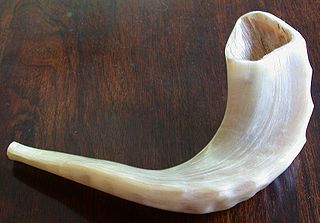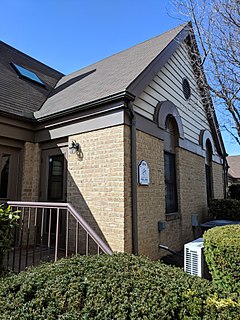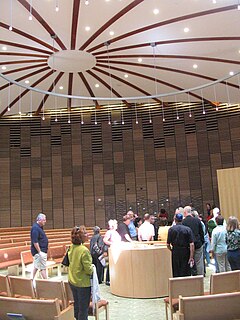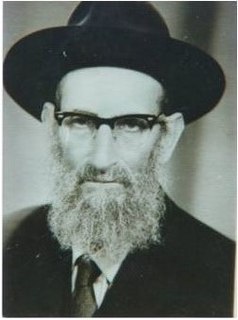
A shofar is an ancient musical horn typically made of a ram's horn, used for Jewish religious purposes. Like the modern bugle, the shofar lacks pitch-altering devices, with all pitch control done by varying the player's embouchure. The shofar is blown in synagogue services on Rosh Hashanah and at the end of Yom Kippur; it is also blown every weekday morning in the month of Elul running up to Rosh Hashanah. Shofars come in a variety of sizes and shapes, depending on the choice of animal and level of finish.
Kol Nidre is an Aramaic declaration recited in the synagogue before the beginning of the evening service on every Yom Kippur. Strictly speaking, it is not a prayer, although commonly spoken of as if it were. This dry legal formula and its ceremonial accompaniment have been charged with emotional undertones since the medieval period, creating a dramatic introduction to Yom Kippur on what is often dubbed "Kol Nidrei night", with the entire Yom Kippur evening service popularly called Kol Nidrei.

Rosh Hashanah is the name of a text of Jewish law originating in the Mishnah which formed the basis of tractates in both the Babylonian Talmud and the Jerusalem Talmud of the same name. It is the eighth tractate of the order Moed. The text contains the most important rules concerning the calendar year, together with a description of the inauguration of the months, laws on the form and use of the shofar and laws related to the religious services during the Jewish holiday of Rosh Hashanah.

The High Holidays also known as the High Holy Days, or Days of Awe in Judaism, more properly known as the Yamim Noraim
- strictly, the holidays of Rosh Hashanah and Yom Kippur ;
- by extension, the period of ten days including those holidays, known also as the Ten Days of Repentance ; or,
- by a further extension, the entire 40-day penitential period in the Jewish year from Rosh Chodesh Elul to Yom Kippur, traditionally taken to represent the forty days Moses spent on Mount Sinai before coming down with the second ("replacement") set of the Tablets of Stone.

Hoshana Rabbah is the seventh day of the Jewish holiday of Sukkot, the 21st day of the month of Tishrei. This day is marked by a special synagogue service, the Hoshana Rabbah, in which seven circuits are made by the worshippers with their lulav and etrog, while the congregation recites Hoshanot. It is customary for the scrolls of the Torah to be removed from the ark during this procession. In a few communities a shofar is sounded after each circuit.
Aaron ben Jacob ha-Kohen was a Provençal rabbi, one of a family of scholars living at Narbonne, France, and who suffered the expulsion of the Jews in 1306.
Jewish music is the music and melodies of the Jewish people. There exist both traditions of religious music, as sung at the synagogue and domestic prayers, and of secular music, such as klezmer. While some elements of Jewish music may originate in biblical times, differences of rhythm and sound can be found among later Jewish communities that have been musically influenced by location. In the nineteenth century, religious reform led to composition of ecclesiastic music in the styles of classical music. At the same period, academics began to treat the topic in the light of ethnomusicology. Edward Seroussi has written, "What is known as 'Jewish music' today is thus the result of complex historical processes". A number of modern Jewish composers have been aware of and influenced by the different traditions of Jewish music.

The history of the Jews in Iceland starts in 1625. In 2018, around 250 Jews were living in Iceland. They often gather to celebrate the Jewish holidays. The first rabbi to be permanently located in Iceland since 1918 moved to the country in 2018.

Rosh Hashanah, literally meaning "head [of] the year", is the Jewish New Year. The biblical name for this holiday is Yom Teruah, literally "day of shouting or blasting." It is the first of the Jewish High Holy Days, as specified by Leviticus 23:23–25, that occur in the late summer/early autumn of the Northern Hemisphere.
An aliyah is the calling of a member of a Jewish congregation to the bimah for a segment of Torah reading.
Lesbian, gay, bisexual, transgender (LGBT) affirming denominations in Judaism are Jewish religious groups that welcome LGBT members and do not consider homosexuality to be a sin. They include both entire Jewish denominations, as well as individual synagogues. Some are composed mainly of non-LGBT members and also have specific programs to welcome LGBT people, while others are composed mainly of LGBT members.

Congregation Kol Ami is a Reform synagogue in Frederick, Maryland, United States.
"Guide for the Halakhic Minyan" is a work published to provide Jewish worship groups, especially Partnership minyans, with halachic sources that support the participation of women in leadership roles in traditional worship services, including the reading from the Sefer Torah, Haftarah, and other special biblical readings, such as the Book of Esther on the Jewish festival of Purim.

Congregation Kol Shofar is a Conservative synagogue founded in 1962 and located in Tiburon, California. The congregation is led by Rabbis Susan Leider and Paul Steinberg, both of whom were ordained by the Ziegler School of Rabbinic Studies.
Temple Kol Ami may refer to:
Chaya Gusfield is an American, Northern California attorney, known for being one of the two first openly lesbian rabbis ordained by the Jewish Renewal movement. Gusfield and Rabbi Lori Klein were ordained at the same time in January 2006.

Amram Aburbeh, also spelled Abourabia and Aburabia, was the Chief Rabbi of the Sephardic congregation in Petah Tikva, Israel and author of Netivei Am, a collection of responsa, sermons, and Torah teachings.
Call of the Shofar was an organization based in Baltimore, US, focusing on personal and relational transformation. Call of the Shofar offers workshops assisting individuals to enhance their personal relationships. The organization's director is Steven (Simcha) Frischling.

The blowing of the shofar is a ritual performed by Jews on Rosh Hashanah. The shofar is a musical horn, typically made of a ram's horn. Jewish law requires that the shofar be blown 30 times on each day of Rosh Hashanah, and by custom it is blown 100 or 101 times on each day.
Speak unto the children of Israel, saying: In the seventh month, in the first day of the month, shall be a solemn rest unto you, a memorial proclaimed with the blast of horns, a holy convocation.







